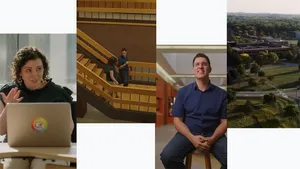Imagining new ways to learn Morse code’s dots and dashes
We first met Emmett at Adaptive Design Association, an organization near Google’s NYC office that builds custom adaptations for children with disabilities. Communicating for him is difficult—he uses a clear plastic word board and looks at specific squares to try and get across what he wants to say. We thought we might be able to help.
At the time, we were working on a special Morse Code layout for Gboard. With its simple dot and dash encoding, Morse is a good fit for assistive tech like switch access and sip-and-puff devices. Emmett was hoping to learn Morse as a more robust form of communication, and we wanted to make a small game to help him learn the new alphabet.
Our first attempt was a small connect-the-dots spelling toy that drew Emmett's favorite cartoon character and only took a few days to build. After watching Emmett get set up with his switches and start excitedly conquering pieces of the little Morse toy, we knew we wanted to do more. We partnered with Adaptive Design on a 48 hour hackathon, where independent designers and game developers worked with Emmett and another 4 kids to prototype games that made Morse code fun to learn.
The kids played the role of creative directors, using their imagination to set the vision for their own games. Each game reflected their interests and personalities. Hannah’s passion for music led to a game where you play notes by typing them in Morse. Matthew combined his interest in soccer and spy thrillers to make a game where you shoot soccer balls at targets by typing their corresponding Morse letters. Emmett made a maze you solve writing different letters. Ben, who likes trains, made a game where YouTube videos are shown on a train once the correct letters are typed in Morse Code. And Olivia’s love for talent shows led to a game called “Alphabet’s Got Talent.”
We’re posting the code for each independent team's games on the Experiments with Google website, where you can also find open-source examples that will help you get started with your own Morse-based apps. If you’re a developer, we hope these resources will inspire you to get involved with the community and make a difference by building your own accessibility projects.






